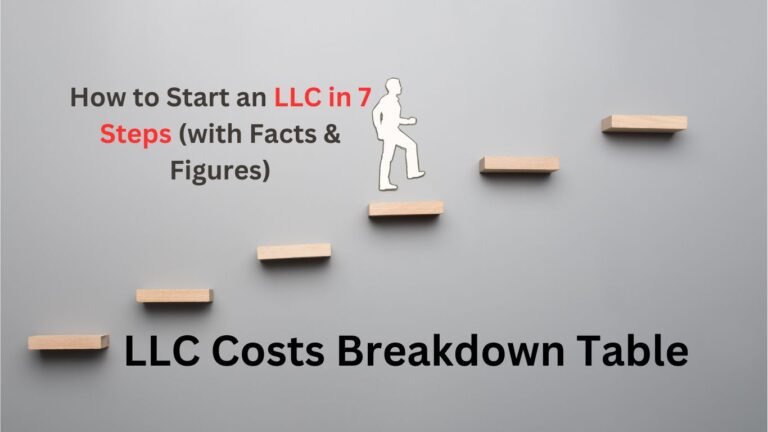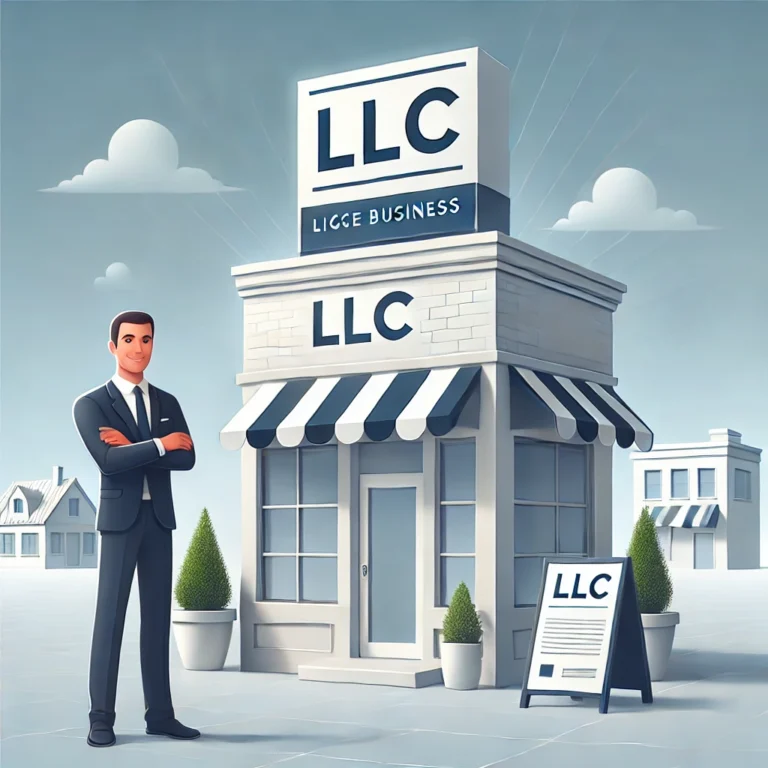LLC vs Corporation: Choosing the Right Structure
Table of Contents
Are you pondering whether an LLC or a corporation ( LLC vs Corporation ) suits your business best? This choice significantly impacts your company’s legal, financial, and operational sides. But what exactly distinguishes these two entities?
Key Takeaways
- Understand the fundamental differences between LLCs and corporations in terms of legal structure, ownership, management, and taxation.
- Explore the unique advantages and disadvantages of each entity type to determine the best fit for your business goals and growth plans.
- Learn about the formation and maintenance requirements, including the process of incorporation or LLC registration.
- Discover how personal liability protection and tax implications can influence your choice between an LLC and a corporation.
- Gain insights into industry-specific factors and the role of professional advisors in guiding your decision-making process.
Choosing the right business structure is a pivotal step in your entrepreneurial journey. It’s essential to grasp the available options and how they match your specific needs. This guide will explore the details of LLCs and corporations, equipping you to make a well-informed choice for your business’s future.
Understanding the Difference Between LLCs and Corporations
Limited liability companies (LLCs) and corporations are the top choices for business structures. Both protect business owners from personal liability. Yet, they differ significantly in legal and operational aspects.
Legal Structures: Definition and Key Distinctions
An LLC blends the tax benefits of a partnership with the liability protection of a corporation. Governed by state laws, LLCs shield their owners’ personal assets from the company’s financial burdens. This makes them appealing for many business types.
A corporation, by contrast, is a distinct legal entity owned by shareholders. It is bound by federal and state laws, offering shareholders liability protection akin to LLCs. Corporations can also raise capital through stock sales, a key advantage for financing.
Advantages and Disadvantages of Each Entity Type
LLCs stand out for several reasons:
- They benefit from pass-through taxation, sidestepping the double taxation corporations face
- Offer a flexible management setup, with choices between member-managed or manager-managed structures
- Require less in terms of formation and upkeep compared to corporations
Corporations, however, have their own set of benefits:
- They can secure capital through stock sales
- Enjoy perpetual existence, continuing to operate even after the initial owners depart
- Feature a more structured approach to decision-making, suited for larger or more complex enterprises
The decision between an LLC and a corporation hinges on your business objectives, tax strategies, and the desired level of structure and formality.
The table below contrasts the main features and differences between LLCs and corporations. This comparison aids in determining which entity type aligns best with your business needs.
LLC vs Corporation: Formation and Maintenance Requirements
Choosing between an LLC and a corporation for your business is a critical decision. It’s essential to grasp the formation and upkeep needs of each entity. This knowledge ensures your choice matches your business objectives and requirements.
The llc formation process involves submitting articles of organization to the state. You must include details such as the company name, registered agent, and member information. On the other hand, corporation formation entails incorporating through the state. This requires filing articles of incorporation, detailing the corporate structure, directors, and shareholders.
For llc maintenance, ongoing tasks include filing annual reports, maintaining a registered agent, and following state-specific compliance rules. In contrast, corporation maintenance demands regular shareholder meetings, detailed meeting minutes, and periodic reports to state and federal bodies.
The business registration process for LLCs and corporations varies by state. Filing fees and paperwork differ across jurisdictions. It’s crucial to look into the specific guidelines in the state where you aim to set up your business.
| Formation Requirements | Ongoing Maintenance |
| LLC: File articles of organizationCorporation: File articles of incorporation | LLC: Annual reports, registered agent, state-specific complianceCorporation: Shareholder meetings, meeting minutes, periodic state/federal filings |
Understanding the complexities of llc formation, corporation formation, llc maintenance, and corporation maintenance can be complex. However, recognizing the main differences aids in selecting the right business structure for your needs.
Personal Liability Protection: How LLCs and Corporations Compare
The main difference between LLCs and corporations in terms of personal asset protection is their liability structures. Both entities provide a crucial shield, protecting your personal llc liability protection and corporation liability protection from business liability related to your company’s activities.
Shielding Personal Assets from Business Liabilities
Forming an LLC or corporation allows you to separate your personal finances from your business. This means your personal assets, like your home, savings, and investments, are generally safe from being seized or used to pay off your company’s debts or legal issues.
Yet, this liability shield is not foolproof. In cases of fraud, negligence, or personal guarantees, your personal assets could still be at risk. It’s vital to maintain proper business practices, keep accurate records, and follow the law to ensure the personal asset protection offered by LLCs and corporations.
| LLC Liability Protection | Corporation Liability Protection |
| LLCs provide a strong shield, protecting the personal assets of the owners (members) from the debts and liabilities of the business. This separation of personal and business assets is a key benefit of the LLC structure. | Corporations also offer robust personal asset protection, as the corporation is considered a separate legal entity from its shareholders. This means that the shareholders’ personal assets are generally shielded from the corporation’s liabilities. |
Both LLCs and corporations can offer effective personal asset protection, allowing you to pursue your business goals without risking your personal financial well-being. It’s essential to understand the specifics of these liability structures to make the right choice for your needs and situation.
Tax Implications: LLCs vs Corporations
Choosing between an LLC and a corporation for your business requires a deep understanding of tax implications. The key difference lies in taxation methods. LLCs use pass-through taxation, while corporations might face double taxation.
Double Taxation and Pass-Through Taxation Explained
Corporations face double taxation. The business is taxed on its profits, and then shareholders are taxed again on dividends. In contrast, pass-through taxation for LLCs means income is reported on personal tax returns, avoiding double taxation.
| Tax Implications | LLCs | Corporations |
| Tax Structure | Pass-through taxation | Double taxation |
| Taxation of Business Income | Reported on owner’s personal tax return | Taxed at the corporate level, then again when distributed as dividends |
| Tax Rates | Owner’s personal income tax rate | Corporate tax rate, plus personal income tax rate on dividends |
The decision between an LLC tax or corporation tax structure significantly affects your business taxation. It also impacts the level of double taxation or pass-through taxation you’ll encounter. It’s crucial to consider these factors when choosing the right business entity for your needs.
Ownership and Management Structures
When exploring llc ownership and corporation ownership, the differences are striking. LLCs offer a flexible model, allowing single or multiple members to own shares. In contrast, corporation ownership revolves around shareholders, who possess company stock.
The management structures of LLCs and corporations also diverge. LLCs can be managed by members, managers, or both, giving entrepreneurs significant control over the business governance. Corporations, however, have a structured management setup. A board of directors oversees operations and makes key decisions.
- LLCs provide flexible ownership and management options, offering greater control and customization.
- Corporations have a structured, hierarchical model with shareholders and a board of directors.
- The business governance approach significantly affects decision-making, control, and the company’s operations.
“The ownership and management structure you choose for your business can have a profound impact on its long-term success and your personal involvement in day-to-day operations.”
The decision between an LLC and a corporation hinges on your specific needs, goals, and desired control level. Thoughtfully evaluating the ownership and management aspects can guide you to a decision that matches your entrepreneurial vision.
LLC vs Corporation: Raising Capital and Equity Financing
Securing financing and attracting investors is crucial for any business. The choice between LLCs and corporations significantly impacts these efforts. Each structure offers distinct benefits and challenges in capital raising and equity issuance.
Attracting Investors and Issuing Stock Options
Corporations excel in equity financing due to their ability to issue stocks and stock options. These instruments are highly appealing to investors looking for ownership and potential returns. In contrast, LLCs often opt for llc financing and corporation financing alternatives, such as venture capital, angel investments, or debt financing.
Corporations can use stock options to draw and keep top talent. This strategy is pivotal for investor attraction and fostering a strong team. LLCs, while offering profit-sharing or incentives, lack the capacity to issue stock options.
| Financing Option | LLCs | Corporations |
| Equity Financing | Limited options, typically rely on venture capital, angel investors, or debt financing | Can issue stocks and stock options, attractive to investors seeking ownership stakes |
| Stock Options | Limited ability to offer stock options to employees | Can offer stock options as an incentive to attract and retain talent |
The decision between an LLC and a corporation hinges on your business objectives, financing requirements, and the unique benefits each structure provides. Consulting with legal and financial experts can guide you in selecting the optimal llc financing or corporation financing strategy.
LLC vs Corporation: Key Considerations for Small Businesses
Choosing the right business structure is a pivotal decision for small business owners and aspiring entrepreneurs. When deciding between a small business LLC and a small business corporation, several key factors come into play.
Liability protection is a top concern for any startup business structure. Both LLCs and corporations shield your personal assets from business debts and liabilities. Yet, the extent of protection differs, making it crucial to grasp the specifics.
- LLCs generally provide more robust liability protection, as the business is treated as a separate legal entity from its owners.
- Corporations can also offer liability protection, but shareholders may still be held accountable in certain scenarios, such as personal guarantees or negligence.
For entrepreneur considerations, taxation is another vital aspect. LLCs offer flexible tax options, allowing you to be taxed as a sole proprietorship, partnership, or S-corporation. Corporations face the risk of “double taxation,” with the business and shareholders each paying taxes on the same income.
| Factors | LLC | Corporation |
| Liability Protection | Strong personal asset protection | Potential for shareholder liability in certain scenarios |
| Taxation | Flexible tax structures, including pass-through taxation | Potential for “double taxation” on corporate income and personal dividends |
| Ownership and Management | More flexible, with member-managed or manager-managed options | Formal board of directors and shareholder structure |
| Raising Capital | Typically easier for small businesses to obtain funding | Ability to issue stock and attract investors, but more complex compliance requirements |
The decision between a small business LLC and a small business corporation hinges on your business’s specific needs, growth goals, and entrepreneur considerations. It’s essential to weigh the pros and cons of each entity type and seek professional advice. This ensures you make a well-informed choice that supports your long-term objectives.
Flexibility and Adaptability: Comparing LLCs and Corporations
As your business grows and evolves, the ability to adapt your organizational structure is crucial. When it comes to LLC flexibility and corporation flexibility, there are significant differences to consider.
Changing Structures as Your Business Grows
LLCs often provide more business growth opportunities regarding entity conversion and business restructuring. The process of converting from an LLC to a corporation, or vice versa, is generally simpler than transitioning between different corporation types. This flexibility enables entrepreneurs to optimize their legal structure as their business needs evolve over time.
- LLCs can easily transition to a corporation or other entity type with minimal paperwork and fees.
- Corporations may face more complex and costly procedures when changing their legal structure.
- The ability to adapt the business structure is crucial as a company scales and expands.
The choice between an LLC and a corporation should be based on your current and future business goals. It should also consider the level of llc flexibility and corporation flexibility needed to support your organization’s growth and evolution.
“The ability to adapt your business structure is key to navigating the changing landscape of entrepreneurship.”
Industry-Specific Factors to Consider
When deciding between an LLC or corporation tailored to your industry, it’s vital to weigh the unique factors at play. The regulatory framework, investment climate, and operational demands of your sector significantly influence your choice. Each element can shape the best business structure for you.
Regulatory environments vary across industries, with some, like finance, healthcare, or aviation, imposing stringent compliance or licensing. This might tilt the scales towards a corporation for these sectors. Conversely, an LLC might offer flexibility in less regulated fields.
Investor preferences also play a pivotal role. Some might lean towards the structured nature of a corporation, while others might prefer the LLC’s flexibility and tax benefits. This diversity in investor views can sway your decision.
Operational requirements are another critical factor. For instance, tech or manufacturing sectors might benefit from a corporation’s formal management structure. On the other hand, service industries could thrive with an LLC’s adaptability and regulatory agility.
Ultimately, the decision hinges on a thorough evaluation of your business’s specific needs, the industry’s dynamics, and regulatory demands. Seeking advice from seasoned professionals, such as attorneys and accountants, can guide you through these complexities. They can help you make a well-informed choice for your venture.
“Choosing the right business structure is crucial for the long-term success and viability of your industry-specific venture.”
The Role of Professional Advisors in Choosing an Entity
Choosing the right business structure, whether an LLC or a corporation, is crucial. It involves legal, tax, and operational complexities. Seeking professional consultation is invaluable in this process. Experienced attorneys, accountants, and business advisors bring the necessary expertise to the table.
Consulting Attorneys, Accountants, and Business Advisors
An attorney offers legal counsel on forming your business, protecting it from liabilities, and ensuring compliance. They guide you on the best structure for your business goals and industry.
An accountant provides insights on tax planning for LLCs and corporations. They explain the differences between pass-through taxation and double taxation. Additionally, they help with financial projections to support your decision-making.
A business consultant offers comprehensive business structure advice. They consider your growth plans, funding needs, and operational preferences. This expert guidance helps you evaluate the pros and cons of each option.
Working with these professional advisors ensures you make an informed choice. This choice is crucial for your business’s long-term success.
“Seeking guidance from experienced professionals can be the key to selecting the optimal business structure for your unique needs.”
Step-by-Step Guide to Forming an LLC or Corporation
Setting up your business as an LLC or corporation is vital for its success and longevity. The llc formation process and corporation formation process might seem complex, but with proper guidance, you can easily manage the business registration and filing requirements. Let’s delve into the key steps for forming your legal entity.
Choosing Your Entity Type
First, determine if an LLC or corporation fits your business best. Think about liability protection, tax effects, and ownership structure to make a well-informed choice.
Completing the Necessary Paperwork
After choosing your entity type, prepare and file the required legal paperwork. This often includes articles of incorporation or organization, operating agreements, and other documents tailored to your state’s business registration needs.
Registering Your Business
Next, register your LLC or corporation with the state authorities. This entails obtaining a business license, registering your trade name, and securing any necessary permits or licenses.
Obtaining an Employer Identification Number (EIN)
An EIN, or Federal Tax Identification Number, is a unique identifier for your business. Apply for an EIN from the Internal Revenue Service (IRS) to meet tax and reporting obligations.
Finalizing the Process
The final step involves completing any remaining filing requirements and administrative tasks. This includes opening a business bank account, obtaining necessary insurance, and setting up your accounting and record-keeping systems.
The llc formation process and corporation formation process differ based on your location and business needs. Always consult a professional, like an attorney or accountant, to ensure you comply with business registration and filing requirements.
“Forming a legal entity is a crucial step in establishing a strong foundation for your business’s future success.”
LLC vs Corporation: Real-World Examples and Case Studies
Choosing between an LLC and a corporation can be daunting. Yet, real-world success stories offer valuable insights. Let’s delve into a few examples that highlight the differences between these business structures. They also shed light on the factors that swayed these entrepreneurs’ decisions.
Acme Manufacturing, a leading precision engineering firm, chose a corporate structure. This was to facilitate their aim of raising capital through an initial public offering (IPO). The founders believed the corporation’s formal governance and reporting would attract more investors. It would also provide access to resources for growth.
On the other hand, Bespoke Artisanal, a boutique luxury goods maker, went for an LLC. They were drawn to the flexible management structure and the pass-through taxation benefits. These allowed them to reinvest profits and maintain control over operations. This choice was ideal for their niche market and their plans for slow, strategic growth.
FAQ
What is the difference between an LLC and a corporation?
The main distinction between an LLC and a corporation lies in their legal setup and taxation methods. LLCs offer liability protection for owners and a flexible structure. Corporations, however, have a formal setup with shareholders, a board of directors, and officers.
What are the advantages of forming an LLC?
LLCs stand out for their liability protection for owners, flexible management options, pass-through taxation, and fewer administrative tasks. This makes them a popular choice for many businesses.
What are the advantages of forming a corporation?
Corporations benefit from the ability to raise capital through stock sales, ensuring perpetual existence, and gaining credibility with investors and customers. They also have a structured management system with clear roles for shareholders, directors, and officers.
How do the formation and maintenance requirements differ between LLCs and corporations?
Starting an LLC is simpler, requiring less paperwork and lower initial costs than incorporating a business. Corporations, however, have stricter ongoing compliance needs, including annual meetings, record keeping, and specific tax filings.
How do LLCs and corporations differ in terms of personal liability protection?
Both LLCs and corporations shield the personal assets of owners or shareholders from business debts and liabilities. Yet, personal liability can still occur if the business owner engages in fraudulent or unethical acts.
What are the key tax considerations when choosing between an LLC and a corporation?
LLCs benefit from pass-through taxation, where income is reported on personal tax returns. Corporations face “double taxation,” being taxed as an entity and then shareholders taxed on dividends.
How do the ownership and management structures differ between LLCs and corporations?
LLCs offer flexibility in ownership and management, allowing for a customized operating agreement. Corporations have a structured management setup with shareholders, directors, and officers, each with specific roles.
What are the considerations for small businesses when choosing between an LLC and a corporation?
Small businesses and startups often prefer LLCs for their flexibility and liability protection. Corporations might be more suitable if the business aims to raise significant capital or go public.
Can an LLC be converted to a corporation, and vice versa?
Yes, switching between an LLC and a corporation is possible as a business grows. The process involves filing paperwork and considering the legal, tax, and operational effects of the change.
What role do professional advisors play in choosing a business structure?
Professional advisors like attorneys and accountants are crucial when deciding between an LLC and a corporation. They offer insights on legal, tax, and operational aspects to help align with business goals.








One Comment